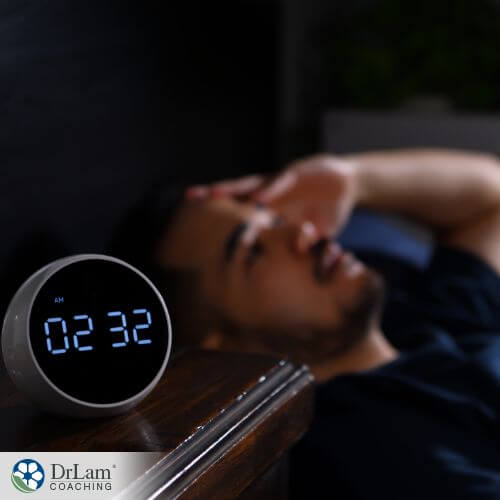 Sleeping well is one of the most important things you can do for your health. It’s the time when your body and your mind rest and heal. And people who sleep poorly often experience a wide range of health problems from inflammation to chronic health disorders. Despite this, sleeping well just doesn’t always come naturally to a lot of people. Many people struggle to sleep, and others find that what they believe about sleep directly impacts their sleep quality. In fact, there are a lot of studies and anecdotal evidence that explore how sleep belief affects insomnia. So let’s take a look at some of that evidence and what it might mean for you.
Sleeping well is one of the most important things you can do for your health. It’s the time when your body and your mind rest and heal. And people who sleep poorly often experience a wide range of health problems from inflammation to chronic health disorders. Despite this, sleeping well just doesn’t always come naturally to a lot of people. Many people struggle to sleep, and others find that what they believe about sleep directly impacts their sleep quality. In fact, there are a lot of studies and anecdotal evidence that explore how sleep belief affects insomnia. So let’s take a look at some of that evidence and what it might mean for you.
There are many different forms of poor sleep, many of which you may be guilty of and may not even think about. Poor sleep isn’t just sleeping disorders like sleep apnea, it can also be:
These issues, if they become habits, can lead to unhealthy sleep patterns over the long term as well as to severe behavioral, emotional, or physical issues.
It’s very common for people these days to underestimate the impact of poor sleep. In fact, sleeping poorly can negatively impact every part of your life, causing:
Before looking at how sleep belief affects insomnia, we need to understand what sleep beliefs or attitudes are. There are several different components to sleep attitudes, which can be broken down into:
These three components must work in tandem for you to have positive sleep beliefs. It’s not enough for you to believe sleep is important and feel positive about good sleep, you also need to take action and implement habits that support these beliefs. And when these three components work together, you’ll probably find that your sleep hygiene, quality, and duration all improve markedly.
Obviously, anyone can have poor sleep beliefs. However, studies have shown that there are certain factors that are associated with poor sleep beliefs such as:
Several studies have examined how poor sleep belief affects insomnia. Basically, it looks like dysfunctional sleep beliefs help to support insomnia. People with insomnia can be:
 Unrealistic about how much sleep they need
Unrealistic about how much sleep they needPeople with insomnia also tend to experience a lot of fear, worry, and anxiety. They focus on internal and external threats to their sleep, which develop and worsen their negative sleep beliefs. In the end, all this worry and rumination only worsens sleep beliefs and poor sleeping patterns. This creates a downward spiral of poor sleep and negativity.
Poor sleeping patterns are also highly prevalent in people with psychiatric disorders and may be an early warning sign of these disorders.
If you sleep poorly over a long period, it may severely impact your stress levels. This may make you more prone to conditions like Adrenal Fatigue Syndrome (AFS), which is a stress-related disorder brought on by chronic stress.AFS is the non-Addison's form of adrenal dysfunction, where the body's stress response cannot keep up with life's chronic stressors.
When you’re stressed, your body helps you cope by prompting the adrenal glands to release cortisol. Cortisol is often called the stress hormone, as it causes changes throughout your body that prepare you to flee or fight the cause of the stress. This is supposed to be a short-term response to stress, however, and you can experience severe issues if your cortisol levels remain high over the long term.
Stress is often chronic in the modern world, which means that your body will constantly demand more cortisol from your adrenal glands. Over time, this can cause the adrenals to become fatigued. And if this situation isn’t corrected, this fatigue will worsen until your adrenals can no longer keep up with the demand.
The body’s organ systems, which can be arranged into six circuits, are also severely impacted when you have adrenal fatigue. The high levels of cortisol will force them to stay in a stressed state.
This means that some functions are slowed down, such as your digestion, and others are sped up, such as your nervous system. In stressful situations, this makes sense, as you don’t need to digest when you’re running from a tiger - you just need the extra energy and alertness that your nervous system can give you. But when this change becomes permanent because of ongoing stress, it can cause your organs and body systems to become dysfunctional.
The information about how sleep belief affects insomnia is particularly relevant to the Neuroaffect Circuit. In adrenal fatigue, this circuit can be severely negatively impacted, which can be a cause of sleeping problems and can also worsen existing ones.
The Neuroaffect Circuit is part of your body’s stress response and is directly impacted by high cortisol levels. This circuit consists of the brain, the gut, and the autonomic nervous system, which all work together to help you cope with stress.
When this circuit is disrupted because of adrenal fatigue, it can be extremely destructive. Ongoing high cortisol levels force the autonomic nervous system to remain in a stressed state, keeping you wired and without the time to rest and relax. Your nervous system will then release epinephrine in response, which forces the release of more cortisol, worsening the underlying issue.
Poor sleep is also a common symptom of adrenal fatigue because of dysfunctions within the brain that occur when Neuroaffect Circuit becomes unbalanced. When this occurs, the balance of hormones and neurotransmitters in your body will be lost. Norepinephrine and epinephrine can spike and melatonin levels often drop in response to cortisol, making it harder to fall asleep.
The gut will be involved in this as well because of its strong connection to the brain through the vagus nerve. This can result in an overgrowth of bad bacteria and inflammation, which will worsen any existing issues in the brain and autonomic nervous system.
Because of how negative sleep belief affects insomnia, it’s vital that you take action on this issue sooner rather than later. Here’s how:
 Talk to your healthcare practitioner about remedies for your sleeping issues.
Talk to your healthcare practitioner about remedies for your sleeping issues.Supplements can be a valuable tool in your fight against sleeping disorders when used properly and with the guidance of a trained healthcare practitioner. Never attempt to add supplements to your daily routine without this professional guidance, however, as this approach can do more harm than good.
Some supplements that can help with sleep when you have adrenal fatigue are:
Sleep is an often-overlooked essential that allows your body to rest, heal any damage, and face each day with energy. However, sleeping well often isn’t intuitive and it can take work, particularly if you have poor sleep beliefs that are impacting your sleeping patterns.
If you’re struggling to sleep well, then here’s what studies say about how sleep belief affects insomnia and what you can do about it:
If you’d like help to improve your sleep habits or routines, then talk to our team at +1 (626) 571-1234 or click here.

Adrenal Sleep to get more Zs!
Allen, Loyd V, ‘Adrenal Fatigue’, International Journal of Pharmaceutical Compounding, vol. 17, no. 1, 2013, pp. 39-44. https://pubmed.ncbi.nlm.nih.gov/23627245/
Ruggiero, Aria R, Peach, Hannah D, Zendels, Phillip, Gaultney, Jane F, ‘Sleep attitudes as a predictor of sleep outcomes: a secondary data analysis’, Health Psychol Behav Med, vol. 8, no. 1, 2020, pp. 623-635. https://pubmed.ncbi.nlm.nih.gov/34040889/
Ruggiero, Aria R, Peach, & Gaultney, Jane F, ‘Association of sleep attitudes with sleep hygiene, duration, and quality: a survey exploration of the moderating effect of age, gender, race, and perceived socioeconomic status’, Health Psychol Behav Med, vol. 7, no. 1, 2019, pp. 19-44. https://pubmed.ncbi.nlm.nih.gov/34040837/
The research about how sleep belief affects insomnia is in and it’s clear. What you think and feel about sleep profoundly impacts how well you sleep. So, if you want all the benefits of sleeping well, then here’s what you should do about your sleep attitudes.